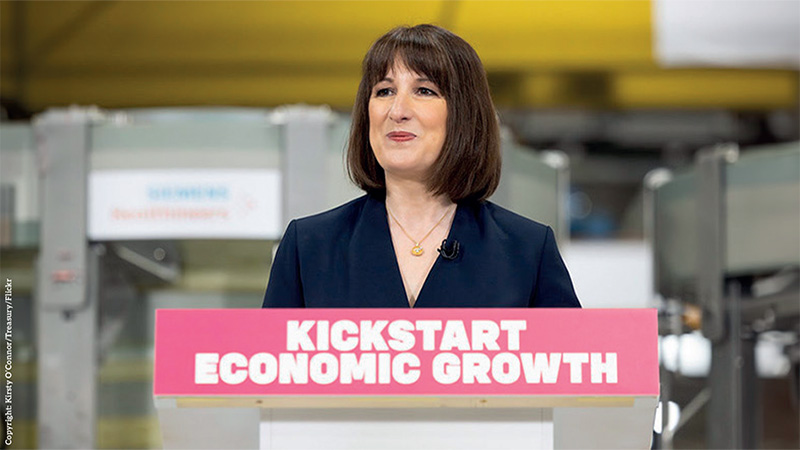Gilts could offer a measure of protection to portfolios if a recession takes hold in the UK, according to Daniel Casali, chief investment strategist at Evelyn Partners.
With Chancellor Rachel Reeves (pictured) facing a very difficult outlook as the Spring Statement nears, confidence in the UK’s near-term economic situation is thin on the ground.
As Casali points out in a commentary note, the Office for Budget Responsibility (OBR) is scheduled to release updated economic and fiscal forecasts on 26 March, and the direction is expected to be down.
Reeves has very limited room to move given that backdrop, and measures to stimulate the economy meaningfully could be conspicuous by their absence from the Spring Statement.
See also: Spot the Dog: Number of underperforming mega funds on the rise
In terms of the implications for investors, Casali sees UK large-cap equities as somewhat insulated from the possible economic downturn.
“UK equities are probably less exposed to risks within the gilt market,” he said. “Despite the country’s economic challenges, large-cap listed companies benefit more from global growth, as UK multinationals generate a significant proportion of their revenues from overseas.
“Moreover, geopolitical disruptions, such as restrictions on energy supplies, could lead to outperformance in value-focused sectors like energy, where the UK stock market has significant exposure.”
The picture in the gilt market is more complex, with time horizons being key.
See more: Will the ‘year of the snake’ be prosperous for investors in Chinese stocks?
“In contrast, by setting self-imposed fiscal rules and setting out an ambitious growth agenda, the government has created a stress point in the gilt market,” Casali said.
“Should the government be seen to be missing its fiscal rules, it is possible that longer-dated gilt yields could rise to reflect doubts over its fiscal credibility, particularly with foreign investors.
“That’s because given that the UK reports a twin budget and current account deficit, it is heavily dependent on the willingness of foreigners to buy gilts,” he continued. “In the last 10 years, foreign purchases of UK debt have been largely behind the positive net portfolio inflows. Without these foreign savings, the sterling exchange rate would probably be a lot lower.
“However, some good news for gilt investors is that the UK’s fiscal challenges and gilt supply issues are well known, whilst weak growth and moderating inflation, albeit with some nearer-term upward pressure from energy and regulated price changes, should encourage lower yields.
Casali added that demand for short and medium-term gilts could rise if the interest paid on cash in deposit accounts falls, as the Bank of England cuts the base rate.
He noted that sterling has “held up relatively well” against a strong dollar, which is helpful.
“The interest rate environment is also markedly different, Casali explained. “With US inflation slowing, the Federal Reserve is cutting interest rates, which puts less downward pressure against sterling.”
“In short, provided inflation does not make a material comeback, gilts could offer some portfolio protection in the event of a recession.”
See more: Schroders CIO: DeepSeek AI disruption highlights need for resilient portfolios








